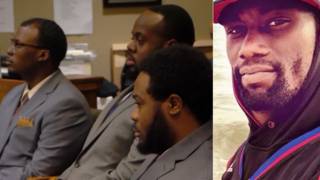
Guests
- Victoria Ruizlead singer of the band Downtown Boys.
- Joey DeFrancescoguitarist of the band Downtown Boys.
Dubbed “America’s most exciting punk band” by Rolling Stone, Downtown Boys is a self-described “bilingual political dance sax punk party” from Providence, Rhode Island. They are known for their electric, politically charged performances. Downtown Boys joins us to perform four songs and discuss the political message behind tracks like “Wave of History.” The music video for that song takes viewers through history, from the theft of Native American land to slavery and police brutality today.
“There’s no way to really think about our current moment without contextualizing it in historical background, and in many ways that’s what can make what we’re doing a true threat, and make it an opportunity to really change what’s happening,” lead singer Victoria Ruiz says.
We also speak with the band’s guitarist. Joey DeFrancesco. Before forming Downtown Boys, DeFrancesco was a hotel worker, who quit in a spectacular stunt involving a marching band. The video went viral with more than 5 million views on YouTube.
Transcript
AMY GOODMAN: This is Democracy Now!, democracynow.org, The War and Peace Report. I’m Amy Goodman, as we turn now to “America’s most exciting punk band.” That’s what Rolling Stone called them. Downtown Boys is a self-described “bilingual political dance sax punk party” from Providence, Rhode Island. They are known for their electric, politically charged performances, which take the audience on a frenzied tour through history, from the slave trade to police brutality today.
A Hartford Courant reviewer wrote, quote, “You can make the case—and people have—that Downtown Boys … was the sound of punk rock in America in 2015.” The reviewer compared their performances to, quote, “anarchic backyard barbecues—part political rally, but all danceable, kinetic party; thrash around, if you want, but pay attention.”
This is “Wave of History,” off their latest album, Full Communism.
DOWNTOWN BOYS: riding in on a wave
a wave of history
riding in on a wave
a wave of history
do what we want
on our wave of history
yeah do what we want
on our wave of history
we are the surge
we are the surge
that’s where we’re at
i can’t hear maybes
that’s where we’re at
i can’t hear maybes
necessity
necessity
not one step back
on the wave of history
you can’t look back
on our wave of history
necessity
necessity
necessity
necessity
Thank you.
AMY GOODMAN: “Wave of History,” Downtown Boys. I’m joined now by Victoria Ruiz, the lead singer of Downtown Boys, and Joey DeFrancesco, the guitarist.
It’s great to have you both with us. So talk about—first, talk about “Wave of History.” Talk about it, Victoria.
VICTORIA RUIZ: Well, “Wave of History,” we wrote it about a year ago, when there was a lot going on in terms of, you know, our own community in Providence. Black Lives Matter marches were happening all around the country, and in Providence there was a very big Black Lives Matter march. And the police kind of picked seven people to arrest. And so, that was happening. We were both involved in a lot of hotel organizing. We were both also trying to do this music thing. And seeing the way that, you know, we were being treated as musicians and just sort of all of these different paths that we were trying to bring together, and we were like, “Wow! We are truly on a wave of history,” and thinking about how there’s no way to really think about our current moment without contextualizing it in historical background. And in many ways, that’s what can make what we’re doing, you know, a true threat and make it an opportunity to really change what’s happening. So, “Wave of History” is really a call for that change to happen and remembering where we come from, not so much to be shocked by it, but to give us some type of terrifying hope to change where we’re at.
AMY GOODMAN: And talk about the music and the graphics of this video.
VICTORIA RUIZ: Well, a lot of that messaging comes from this concept of land. You know, I think Malcolm X has said it, that it’s never been about a desegregated cup of coffee, it’s always been about the land. Cesar Chavez said something similar: It’s not so much about the price of lettuce, it’s about land. And so we really wanted the graphics to be able to portray that story of land and how taking land and taking back land can really shift power. And so, we really wanted to look at—you know, we’re in a current moment where the current criminal justice system and mass incarceration, which includes raids by ICE, is happening as a continuation of the transatlantic slave trade, where land and ocean were taken by the slave ship. And so, we really wanted to tie that and contextualize that idea through maps, through facts and figures about this connection between our current mass incarceration system and slavery. And then we wanted to contextualize it also in what happens economically, so you’ll see, you know, businesses like Coca-Cola and Aetna that come straight out of the slave trade.
AMY GOODMAN: Explain what you mean. Why straight out, Joey, of the slave trade?
JOEY DEFRANCESCO: Well, for example, Aetna and a lot of insurance companies got their start literally insuring slaves and property on slave plantations, so a lot of that capital that these companies began with is coming from the slave trade. It’s not a metaphor. I think sometimes when we say that capitalism is deeply rooted in slavery, people think it’s sort of an exaggeration or, you know, a metaphor. But it’s literally true. Right? All of these companies—not all of them, but a lot of these companies, like Aetna, like JPMorgan, like Lehman Brothers, have direct roots either beginning as companies involved in the slave trade as insurers or literal slave traders, or had some kind of auxiliary part of their initial business. So that capital from that time period obviously carries over and is built into what you have today.
AMY GOODMAN: So this is part of your new album, Full Communism. Why did you call it Full Communism?
JOEY DEFRANCESCO: I think we called it Full Communism—obviously, it’s somewhat of a provocative title. That’s some of what we do. We want to capture attention. But more than that, I think we meant full communism is really kind of a hopeful idea. You know, a lot of our album is angry, and it’s critiquing, but the point of that critique is not that we’re kind of nihilistic and giving up, right? If we were so overwhelmed that we were giving up, we wouldn’t be angry anymore. We would stop talking about this stuff. But we are, in fact, kind of, I think, hopeful and optimistic that we can create something. So, I think we wanted to create some kind of a hopeful message with a title that conveys some kind of utopian idea. So we’re not talking about any kind of like hardcore like Marxism, or like we’re not into any specific like theorists or anything like that, but just this idea of this kind of future better society that we still believe in creating through addressing the things that we talk about on the record.
AMY GOODMAN: Now, Joey, before Downtown Boys, you had gone viral on something totally different. Talk about quitting your job at the Renaissance Hotel. How long ago was this, in Providence?
JOEY DEFRANCESCO: This was in Providence, Rhode Island, 2011. I worked in room service at the Renaissance Providence Hotel. Victoria actually also worked there in the kind of like call desk. So I worked there for like three-and-a-half years. And at the end of that, I made this video of me quitting the job there, where I—
AMY GOODMAN: For real?
JOEY DEFRANCESCO: Yes, for real. It’s real. It’s all real—where I brought in another band I used to play in called the What Cheer? Brigade, which is this kind of a street brass band. And we brought the band in, and, you know, we lured my manager into a hallway, and I told him, “I quit.” And then, when I said, “I quit,” the band kind of played, and we exited out of the building. Yeah.
AMY GOODMAN: Let’s go to that clip. “Joey Quits.”
JARED: You guys, all of you, out, right now!
JOEY DEFRANCESCO: Jared, I’m here to tell you that I’m quitting.
WHAT CHEER? BRIGADE: One, two, three, four! [playing “Bubamara”]
AMY GOODMAN: So, Joey, you quit, with a full band—
JOEY DEFRANCESCO: Mm-hmm.
AMY GOODMAN: —a marching band. You march out. That was your boss who came back to say, “Get out of here”?
JOEY DEFRANCESCO: Yeah, he was my boss, who I had a long history with. Right? I mean, the video kind of—I think a lot of people see it and just think it’s this funny thing, but there’s a lot of backstory, where, you know, it’s like a hotel, and like a lot of service jobs, they were treating us like garbage. In room service, we were getting $5.50 an hour, and then they were stealing half of our tip money. Housekeepers are having to clean 17, 18 rooms. We were getting injured.
AMY GOODMAN: How did they steal your tip money?
JOEY DEFRANCESCO: So, a lot of hotels have, in room service, those little things that say service charge on them, where it says 20 percent service charge or whatever it is. A lot of people think that’s going to the person bringing you the food, and so you don’t tip. In reality, or at least in our case, the hotel company itself was taking a portion of that, and then my direct manager is also taking portions, so at the end of the whole thing, we, as servers, were getting less than half of what that service charge said. So, we’re making a sub-minimum wage, $5.50 an hour, and then they’re taking a bunch of our tip money. So, with all these awful working conditions, we were pushing back. We were trying to organize a union there, and that guy in the video, along with a lot of the other management there, was running this really kind of vicious anti-union campaign. They were targeting people to fire them, they were cutting people’s hours, all the usual things. So, you can see in his face he knows we’ve, you know, had some battles before and that something crazy is happening.
AMY GOODMAN: So, this video went viral.
JOEY DEFRANCESCO: Yes.
AMY GOODMAN: How many views?
JOEY DEFRANCESCO: I think it’s up—it’s up to a bit over 5 million views now.
AMY GOODMAN: And what was the marching band playing?
JOEY DEFRANCESCO: The marching band was playing a song called “Bubamara,” which is based on an old Serbian folk melody. It’s probably an old Roma song. And so, yeah, it’s this old Serbian song, so the video became very popular in Serbia, in fact, and we ended up going to Serbia to do reality shows and stuff.
AMY GOODMAN: So, wait, you were invite on a reality show in Serbia?
JOEY DEFRANCESCO: Yeah, we ended up going. So, it got all this attention, all the—like, this kind of U.S. media, but then it also got into international media, in the—for whatever reason. Because of the Serbian song, the Serbians really liked it. So we got invited to—I got invited to be on a Serbian reality show and was filming over in Belgrade for maybe a month or so.
AMY GOODMAN: So, soon after, you made—you formed Downtown Boys. How did you form it, and why is it called Downtown Boys?
JOEY DEFRANCESCO: So, we formed it mostly out of people in What Cheer?, the brass band in the video. Our original bass player was in that band, and then Norlan, who’s our current drummer. I was also in that band. And then we had another couple folks—a sax player named Emmett, another sax player named Mariel. And we formed it because I think What Cheer? had a political message, but we wanted to create something where we could speak and have a more explicitly political message and also have a smaller unit to be able to create music. So, that formation had a couple shows, and then, very shortly after that, Victoria, who I was working with at the hotel, joined the band. And that’s when it really clicked. It wasn’t very good before Victoria kind of started.
AMY GOODMAN: And you called it Downtown Boys because?
JOEY DEFRANCESCO: So, there’s a Bruce Springsteen song that has the line “downtown boys” in it. That was one of the motivations.
AMY GOODMAN: And them downtown boys sure talk gritty/It’s hard to be a saint in the city.
JOEY DEFRANCESCO: Yeah. So I always liked band names with “boys” in it, and I think it sounds kind of—it’s like simultaneously sounds—it’s kind of like a cool queer-sounding name, but also sounds like tough and queer at the same time. So we kind of liked the feel of that. There’s no really deep thing, but we do love Bruce Springsteen, so…
AMY GOODMAN: Talk about “100% Inheritance Tax.”
VICTORIA RUIZ: “100% Inheritance Tax” is this idea that, one, you know, the rich in this country aren’t paying the amount of taxes that they need to, and our local community, Providence, gets gutted by big corporations that don’t pay the taxes that they should into the community, and then, at the same time, undocumented people are being told, left and right, that, “Oh, you don’t pay taxes. You don’t contribute to the—you know, some type of budget of this government.” And it’s this idea that, you know, under full communism, when we all have that opportunity to be free, we’re going to have to tax it all. We’re not going to destroy it. We’re not going to get rid of it. We’re going to tax it, and it’ll be for the people.
And it’s really this idea that inheritance comes from history. And so, there is a reason why, you know, black men in this country are three times more likely than a white man to be killed by the police. There is a reason in this country that if you’re a white person with a felony record, you are still more likely to get a job than a black man with no felony record. And that’s because of inheritance—racial inheritance, class inheritance. And so, we need to tax not just money, not just houses and cars, but inheritance of history, to really ever fight for some type of equality.
AMY GOODMAN: Let’s go to “100% Inheritance Tax,” the Downtown Boys.
DOWNTOWN BOYS: el piel no va a contar class
el banco no va a prestar más
por eso, es nuestro
lo trata, te gusta
por eso, es nuestro
lo trata, te gusta
1-0-0
1-0-0
1-0-0
1-0-0
el piel no va a contar class
el banco no va a prestar más
por eso, es nuestro
lo trata, te gusta
por eso, es nuestro
lo trata, te gusta
1-0-0
1-0-0
1-0-0
1-0-0
1-0-0
1-0-0
1-0-0
1-0-0
1-0-0
Thank you.
AMY GOODMAN: “100% Inheritance Tax,” Downtown Boys. Our guests are Victoria Ruiz, the lead singer, and Joey DeFrancesco, the guitarist for Downtown Boys. So, the Sex Pistols came out with their first record like 40 years ago, in 1976. Where is punk rock today? And who are your greatest influences, Joey?
JOEY DEFRANCESCO: So, I guess some people today just say, you know, “Punk shouldn’t be done anymore. It was done too long ago. It kind of ran its course.” I think, for us, we’re not like really identifying with some kind of—as a punk band or with punk music. I think punk splintered where it can mean just so many different things at this point. For us, I think we came together as a band and just produced this sound and had these ideas and these musical abilities, which, you know, are somewhat limited maybe, but, you know, we work with it how we can. So, I think, in 2016, for us, at least, it’s not so much about kind of identifying or fighting for a real close, solid punk identity, as much as, you know, producing this thing we as individuals are producing in our band.
As for influences right now, I think it’s mostly kind of outside the punk realm. I think, for example, M.I.A. is one of my biggest influences, and I think is kind of the most important artist of our generation going on right now. So she’s very important. I think Kendrick Lamar put out a record last year that was probably the—the or one of the best records of the year, also very highly political, has a lot of these same attitudes and ideas as punk has for a really long time, but you wouldn’t necessarily call it punk. So I think we’re into drawing from a lot of different influences and ideas, including some in punk, but not necessarily saying we are punk.
AMY GOODMAN: And, Victoria, who are your influences?
VICTORIA RUIZ: I think one of my biggest influences is my family, like my grandma. You know, she was a farmworker, decided to raise this family, move up from the fields in California to San Jose, a bigger city. And when my grandpa passed away, she didn’t move back down with her family. She stayed there and raised the family. I think that that type of history is a big influence and definitely influences what I think of punk. And then, I think like Los Crudos is a really big influence. Selena Quintanilla, who has passed away, was a huge crossover artist, so she was—spoke to a lot of people, both in Mexico and in the United States, and really built a bridge as some type of, you know, cultural ambassador and was this front person, this woman front person, really taking the stage and taking that power. And I think M.I.A., I mean, the way that she speaks about borders, her videos, the way that she just goes out there and is able to speak to—really meet people where they’re at is just so incredible. And then, Bruce Springsteen, I mean, there’s really no one like Bruce Springsteen. And he’s so punk. And, you know, his lyric—
AMY GOODMAN: What do you mean when you say that?
VICTORIA RUIZ: When I—he’s talking about the working class. He’s talking about love. Like, his voice—like, I read the very first time that he was reviewed by NME, which is like the British Rolling Stone, they—the first time he played in the U.K., they did not like his show at all. They were like, “This is awful. Bob Dylan’s got nothing to worry about,” you know? And like, this year they actually retracted that statement on the anniversary. And I thought that that was amazing, you know. And he’s also spoken out against Israel. He’s chosen not to play there and chosen to honor the boycott, which is going to help Palestinians hopefully win liberation soon. So, you know, that’s punk. And that’s what makes me want to do this.
AMY GOODMAN: So, you’re known for giving sort of like political speeches in the middle of the songs. Talk about that.
VICTORIA RUIZ: It’s really—you know, I don’t have the best rhythm. Joey’s really had to help me get that together. I’m not the best musician. And so, it’s kind of what I have to offer. I watch Democracy Now! every day. You know, I read a lot. I talk to a lot of people. And so, that’s kind of something that I can offer. And then, I—as, you know, a Latina woman in the punk scene, I didn’t look like a lot of the people in punk shows that I was going to, and I think kind of the only way to really change that is to just call it out and name it and talk about it. And I just really wanted to build relationships with people who were trying to come into the space. And the only way to do that is to say things directly.
AMY GOODMAN: Let’s go to Downtown Boys, “Monstro.”
DOWNTOWN BOYS: This song is about how some of us are brown and some of us are smart, and the hegemon wants to go looking for a third thing. In the case of football player Richard Sherman, he’s brown, he’s smart; he’s arrogant, because he doesn’t want to talk to someone. In the case of Angela Davis, she’s brown, she’s smart; she’s on trial for murder. Why is it that when people are brown and people are smart, it’s so scary and so threatening? It’s because we’re about to change something. We’re about to take something back with a joyful noise.
monstro que come los muertos
monstro que tiene la culpa
monstro que mames externo
y te mato monstro
monstro que come los muertos
monstro que tiene la culpa
monstro que mames externo
y te mato monstro
no soy
tu claridad
tu actividad
no soy
tu identidad
¿me acuerdas?
no soy
tu identidad
tu claridad
no soy
tu actividad
¿me acuerdas?
she’s brown!
she’s smart!
she’s brown!
she’s smart!
she’s brown!
she’s smart!
she’s brown!
she’s smart!
monstro que come los muertos
monstro que tiene la culpa
monstro que mames externo
y te mato monstro
monstro que come los muertos
monstro que tiene la culpa
monstro que mames externo
y te mato monstro
no soy
tu claridad
tu actividad
no soy
tu identidad
¿me acuerdas?
no soy
tu identidad
tu claridad
no soy
tu actividad
¿me acuerdas?
she’s brown!
she’s smart!
she’s brown!
she’s smart!
she’s brown!
she’s smart!
she’s brown!
she’s smart!
melanin existed.
before the word. slave.
melanin existed.
during the word. slave.
melanin will exist.
after the word. slave.
Thank you.
AMY GOODMAN: Before we go to the last song, “Future Police,” I wanted to ask you about Spark Mag. What is it?
JOEY DEFRANCESCO: Spark Mag is a new website we just launched in November, and it’s a music and arts website that specifically focuses on highlighting politically radical artists. So we launched this in collaboration with an organization called Demand Progress, who are this big, nationwide, grassroots activist group fighting for things like net neutrality, against the surveillance state, in solidarity with people like Chelsea Manning and other whistleblowers. And they wanted to use culture, and liked our band, and wanted to use the kind of cultural network we were working in to channel people into organizing and into activism. So we’ve been working with them for really—took about nine months to a year to get that site together to finally launch in November.
And we’re using it, again, to highlight radical artists from all over the country to allow them to talk about their politics in an unmediated way, because I think sometimes when you talk to usual music websites or mainstream media outlets, often, even if they let you talk about your politics, it’s going to get filtered in a way that’s warping the meaning or tokenizing you or just doing it wrong. So we wanted to create this platform to let musicians write about other musicians or write about themselves or just leave this open in a way where we can kind of create the cultural movement we’re trying to create with our band, but expand it to highlighting other folks we want to support.
AMY GOODMAN: Victoria Ruiz and Joey DeFrancesco, the lead singer and the guitarist for Downtown Boys. Let’s end with “Future Police.”
DOWNTOWN BOYS: The first future police were the sharks that followed the slave ships, instilled the ideas of fear in people of color. Future police have then become things that we wake up and we go to bed with. Think of where you rest your head. What power dynamic are you really sitting in? How do people see the color of your skin? How do people hear or not hear the things wailing from our lungs? Future police determine all of this, so we must fight the future police, in order to protect and continue infinite futures that we all have. The joyful noise, like Sun Ra said, will help us fight the future police.
future police
future police
future police
they’re gonna get you with
sound guns
they’re gonna get you with
light waves
they’re gonna get you with
micro friends
they’re gonna get you with
brown kin
cuz i said so
they’re gonna get you with
violet rays
they’re gonna get you with
backrooms
they’re gonna get you with
app chains
they’re gonna get you with
right to the shins
cuz i said so
and i got you
and i know you
future police
future police
future police
they’re gonna get you with
sound guns
they’re gonna get you with
light waves
they’re gonna get you with
micro friends
they’re gonna get you with
brown kin
cuz i said so
and i got you
and i know you
future police
future police
future police
Thank you.












Media Options